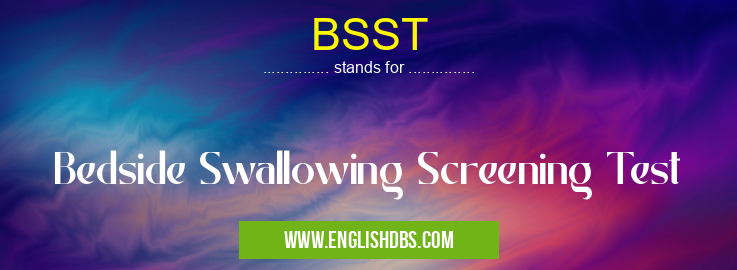What does BSST mean in UNCLASSIFIED
The BSST is a quick and easy screening tool used to identify individuals at risk for swallowing difficulties (dysphagia). It consists of a series of simple tasks that assess oral motor function, swallowing mechanics, and cognitive abilities.

BSST meaning in Unclassified in Miscellaneous
BSST mostly used in an acronym Unclassified in Category Miscellaneous that means Bedside Swallowing Screening Test
Shorthand: BSST,
Full Form: Bedside Swallowing Screening Test
For more information of "Bedside Swallowing Screening Test", see the section below.
- BSST stands for Bedside Swallowing Screening Test.
- It is a quick and easy screening tool used to assess a patient's risk of Dysphagia, or difficulty swallowing.
BSST Procedure
- The test involves observing the patient's swallowing ability while they drink water or eat applesauce.
- The examiner looks for signs of difficulty, such as coughing, choking, or spilling liquid.
- The test takes about 5 minutes to complete.
BSST Interpretation
- A positive BSST result indicates that the patient may have Dysphagia and requires further evaluation.
- A negative result suggests that the patient is at low risk for Dysphagia.
- Further evaluation may involve additional swallowing tests, such as a Videofluoroscopic Swallowing Study, or consultation with a speech-language pathologist.
Benefits of BSST
- Early detection: Can identify patients at risk for Dysphagia early on, leading to timely intervention and improved outcomes.
- Non-invasive: Quick and painless procedure that does not require specialized equipment.
- Cost-effective: Inexpensive to administer compared to other swallowing tests.
- Reliable: Has been shown to have good sensitivity and specificity in detecting Dysphagia.
Essential Questions and Answers on Bedside Swallowing Screening Test in "MISCELLANEOUS»UNFILED"
What is the Bedside Swallowing Screening Test (BSST)?
Why is the BSST important?
Dysphagia is a common problem that can lead to serious complications, including aspiration pneumonia, dehydration, and malnutrition. The BSST helps to identify individuals at risk so that they can receive appropriate evaluation and treatment.
Who should undergo the BSST?
The BSST is recommended for any individual who presents with signs or symptoms suggestive of dysphagia, such as difficulty swallowing, coughing or choking during meals, or a change in voice quality. It is also recommended for individuals who have certain medical conditions or risk factors for dysphagia, such as stroke, head injury, or neurological disorders.
How is the BSST performed?
The BSST is typically performed by a speech-language pathologist or other trained healthcare professional. It involves a series of tasks, including:
- Assessing oral motor function (e.g., lip and tongue movements)
- Observing swallowing mechanics (e.g., coordination of the tongue and throat)
- Evaluating cognitive abilities (e.g., attention, memory)
How long does the BSST take?
The BSST typically takes approximately 5-10 minutes to complete.
What are the limitations of the BSST?
The BSST is a screening tool, and it is not a definitive diagnosis of dysphagia. A negative result on the BSST does not necessarily mean that the individual does not have dysphagia. Conversely, a positive result on the BSST indicates that the individual is at risk for dysphagia and should undergo further evaluation.
Final Words:
- BSST is a valuable screening tool for identifying patients at risk for Dysphagia.
- It is simple, non-invasive, and cost-effective.
- Positive results should prompt further evaluation to confirm the diagnosis and guide treatment.
